The Criterion Channel’s August 2021 Lineup

The Criterion Channel’s August 2021 Lineup
Join us next month on a late-summer moviegoing voyage, with one of Hollywood’s most fearless mavericks at the helm. Our John Huston retrospective surveys the endlessly rich career of the prolific and versatile director behind The Asphalt Jungle, The Man Who Would Be King, and The African Queen (pictured). And just wait until you see who else is on board: smoldering ’30s megastar Jean Harlow; indie giant and die-hard movie lover Richard Linklater; radical provocateur Nico Papatakis; and the incandescent, outspoken, and trailblazing Josephine Baker.
** indicates programming available only in the U.S.
FEATURED SERIES
PREMIERING AUGUST 1
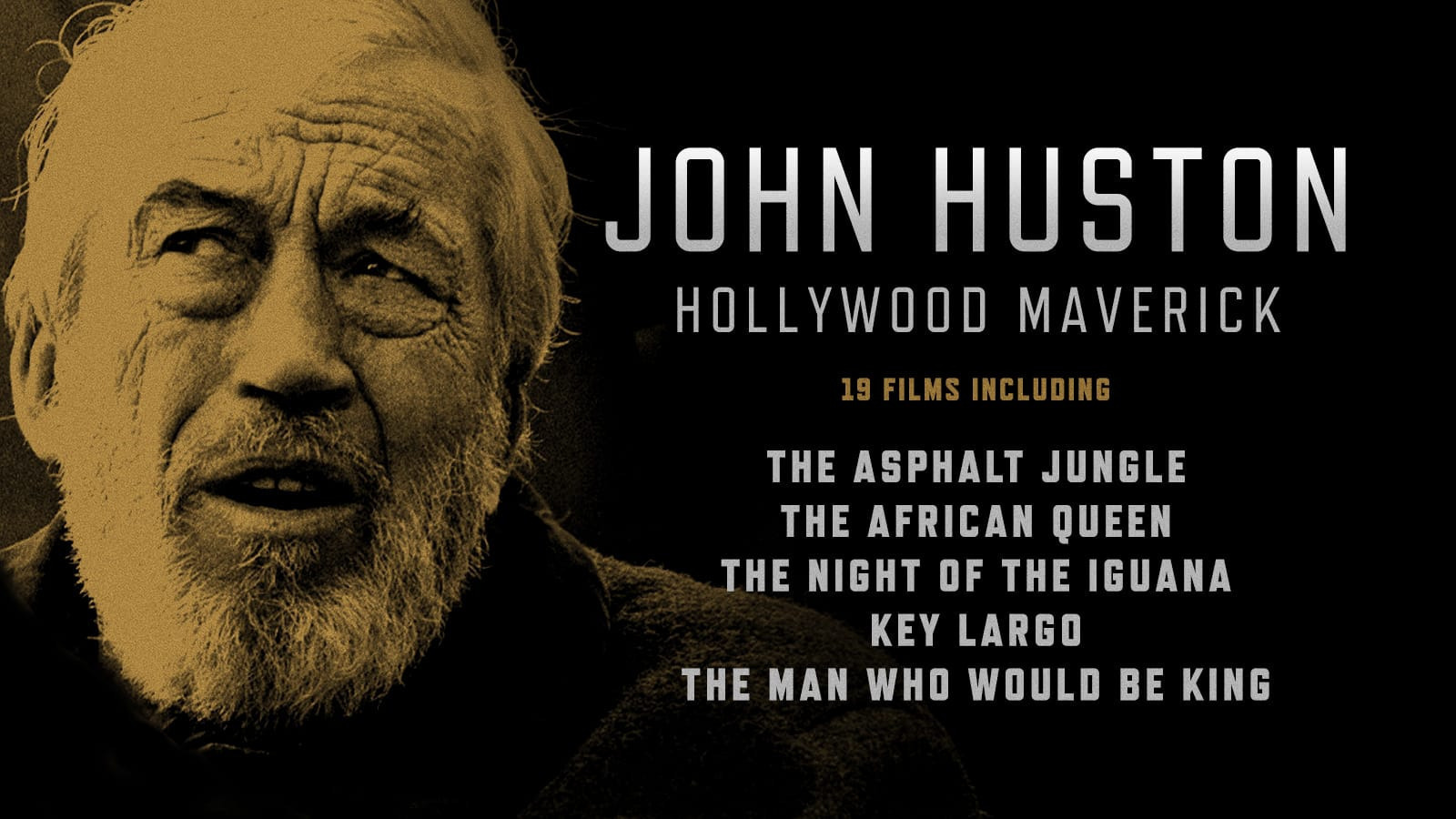
John Huston: Hollywood Maverick
By the time the thirty-one-year-old John Huston settled in Hollywood in 1937, he had already been, among other things, a professional boxer, a painter in Paris, and an honorary member of the Mexican cavalry—all experiences that would lend color and vividness to the extraordinary body of work he would produce over the next fifty years. The son of actor Walter Huston and father of Anjelica Huston, both of whom he would direct in Academy Award–winning performances, Huston contributed classics to nearly every genre, with a special affinity for film noir (The Asphalt Jungle) and brash adventure (The African Queen). An accomplished writer himself, Huston had a particular affinity for literary adaptations, transforming works by Tennessee Williams (The Night of the Iguana), Leonard Gardner (Fat City), Flannery O’Connor (Wise Blood), James Joyce (The Dead), and others into indelible screen art imbued with his own incisive, iconoclastic observations on the human condition.
FEATURING: Across the Pacific (1942), In This Our Life (1942), Let There Be Light (1946), Key Largo (1948), The Treasure of the Sierra Madre (1948)*, The Asphalt Jungle (1950)**, The African Queen (1951), Moulin Rouge (1952), Moby Dick (1956), Heaven Knows, Mr. Allison (1957), Freud (1962), The Night of the Iguana (1964), Reflections in a Golden Eye (1967), A Walk with Love And Death (1969), Fat City (1972), The Man Who Would Be King (1975), Wise Blood (1979), Annie (1982), Under the Volcano (1984), The Dead (1987)
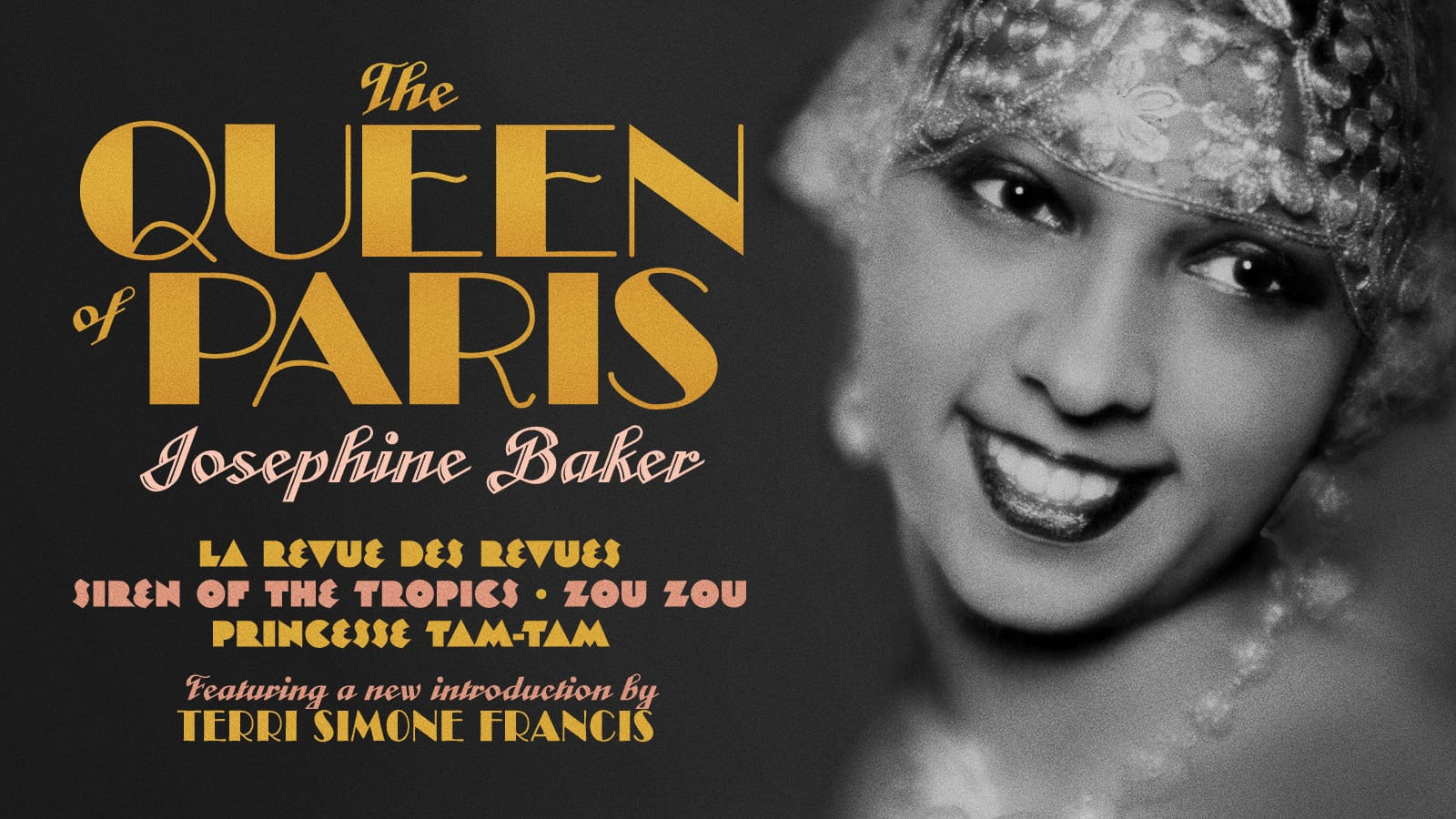
The Queen of Paris: Josephine Baker on Film
Featuring a new introduction by scholar Terri Simone Francis
Dancer, singer, actor, activist, and incandescent emblem of Jazz Age Paris, the elegant, vivacious, and startlingly modern Josephine Baker was born in St. Louis, but it was in her adopted home of France that she first rose to fame performing in the legendary Folies Bergère. Her uninhibited dancing and magnetic stage presence soon established Baker as the toast of Europe, opening the doors to a film career that made her the first Black woman to star in a major motion picture (Siren of the Tropics). Though her screen vehicles—including the splashy backstage musical Zou Zou, which paired her with a young Jean Gabin, and the exuberant comedy Princesse Tam Tam—often cast her in colonialist fantasies, Baker’s supernova talents and megawatt charisma shone through, refusing to be marginalized. Baker was also a fearless participant in the French Resistance, an outspoken civil rights advocate who refused to perform for segregated audiences, and a bisexual trailblazer who played with gender tropes and iconography in ways that were decades ahead of her time.
FEATURING: La revue des revues (1927), Siren of the Tropics (1927), Zou Zou (1934), Princesse Tam Tam (1935)

Richard Linklater’s Adventures in Moviegoing
While other budding directors were honing their craft in film school, Richard Linklater was getting a crash course in the art and history of cinema his own way: by watching anything and everything he could at the local repertory theaters in Houston and Austin, where he discovered the world-cinema masterworks and avant-garde rarities that would inspire him to create independent touchstones like Slacker, Dazed and Confused, and Before Sunrise. In this edition of Adventures in Moviegoing, Linklater sits down to discuss his path from working on an oil rig to directing, why he considers the eighties to be an underrated cinematic decade, and how his Austin Film Society grew from a DIY labor of love into a cultural powerhouse. A seasoned film programmer dating back to his early days as founder of the AFS, Linklater brings a curator’s omnivorous sensibility to the lineup of favorites he has chosen to present, which include a radically subversive family drama by Nagisa Oshima (The Ceremony), an outrageously stylized tour through the Berlin underworld courtesy of Ulrike Ottinger (Ticket of No Return), a torrid François Truffaut deep cut (The Woman Next Door), and a haunting work of pure cinema by James Benning (Landscape Suicide).
FEATURING: The Shepherds of Calamity (1967), The Ceremony (1971), In a Year of 13 Moons (1978), Ticket of No Return (1979), Every Man for Himself (1980), The Woman Next Door (1981), L’argent (1983), Mishima (1985), Landscape Suicide (1987), High Hopes (1988), A Master Builder (2014)
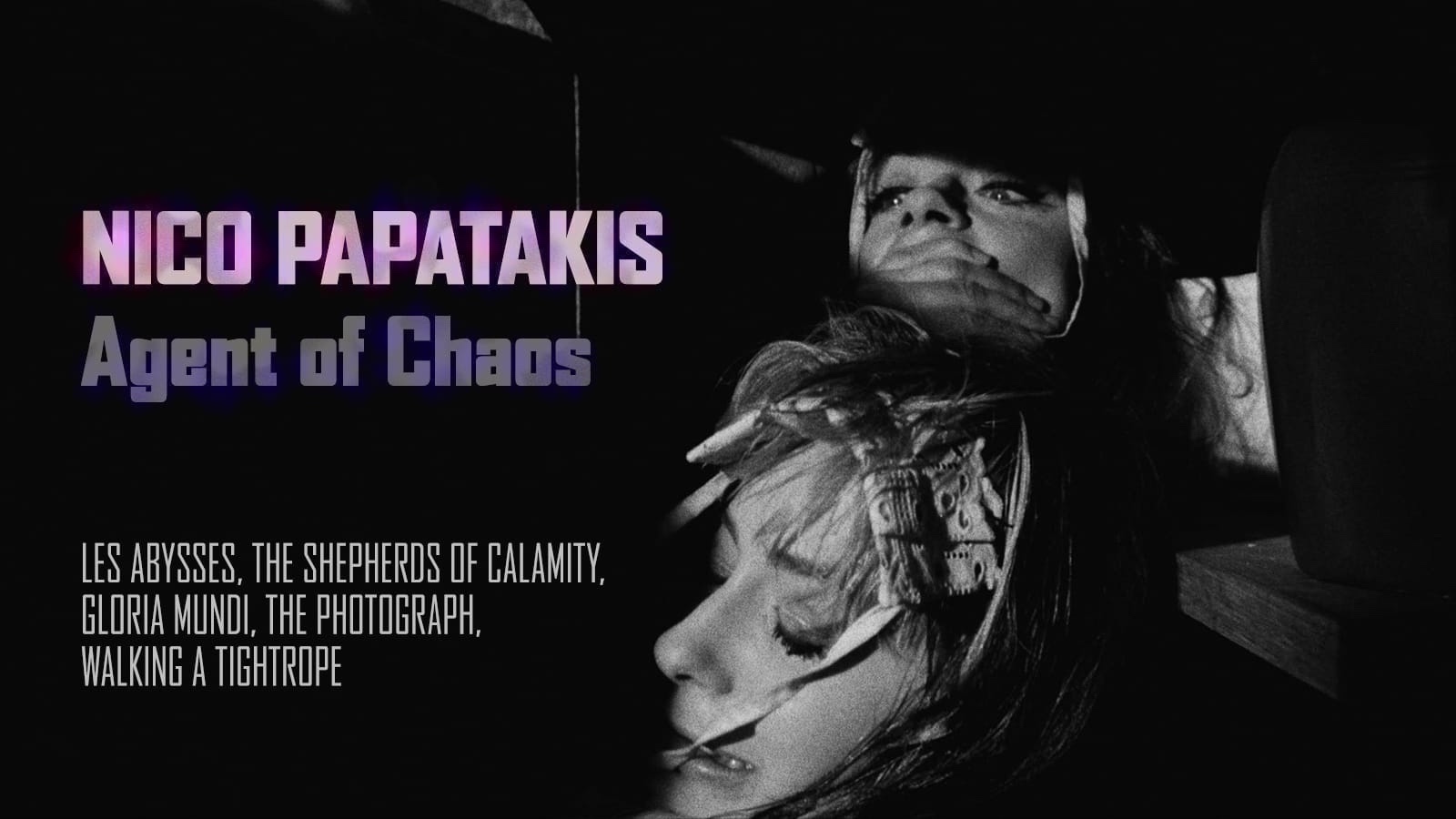
Nico Papatakis: Agent of Chaos
Featuring a new introduction by Athina Rachel Tsangari, in conversation with Richard Linklater
Startling, subversive, and explosively controversial, the films of Ethiopian-born Greek iconoclast Nico Papatakis have long been frustratingly hard to see, but they constitute one of the most radical and neglected bodies of work in all of European cinema. A man of the world who rubbed shoulders with Jean Genet and John Cassavetes (he produced the former’s Un chant d’amour and the latter’s Shadows), Papatakis began his directing career with the incendiary call to class warfare Les abysses, which nearly provoked a riot when it premiered at Cannes in 1963. The scandal was merely a warm-up for a career that courted controversy at every turn and which includes the deliriously surreal romantic tragedy The Shepherds of Calamity and the shocking Algerian War parable Gloria Mundi, a film so inflammatory it could not be shown in Paris for three decades. With their expressionistically heightened style and transgressive themes, Papatakis’s films have served as a major inspiration for the so-called “Weird Wave” of contemporary Greek filmmakers like Yorgos Lanthimos and Athina Rachel Tsangari, who carry on the cinematic rebellion that he launched.
FEATURING: Les abysses (1963), The Shepherds of Calamity (1967), Gloria Mundi (1976), The Photograph (1986), Walking a Tightrope (1991)
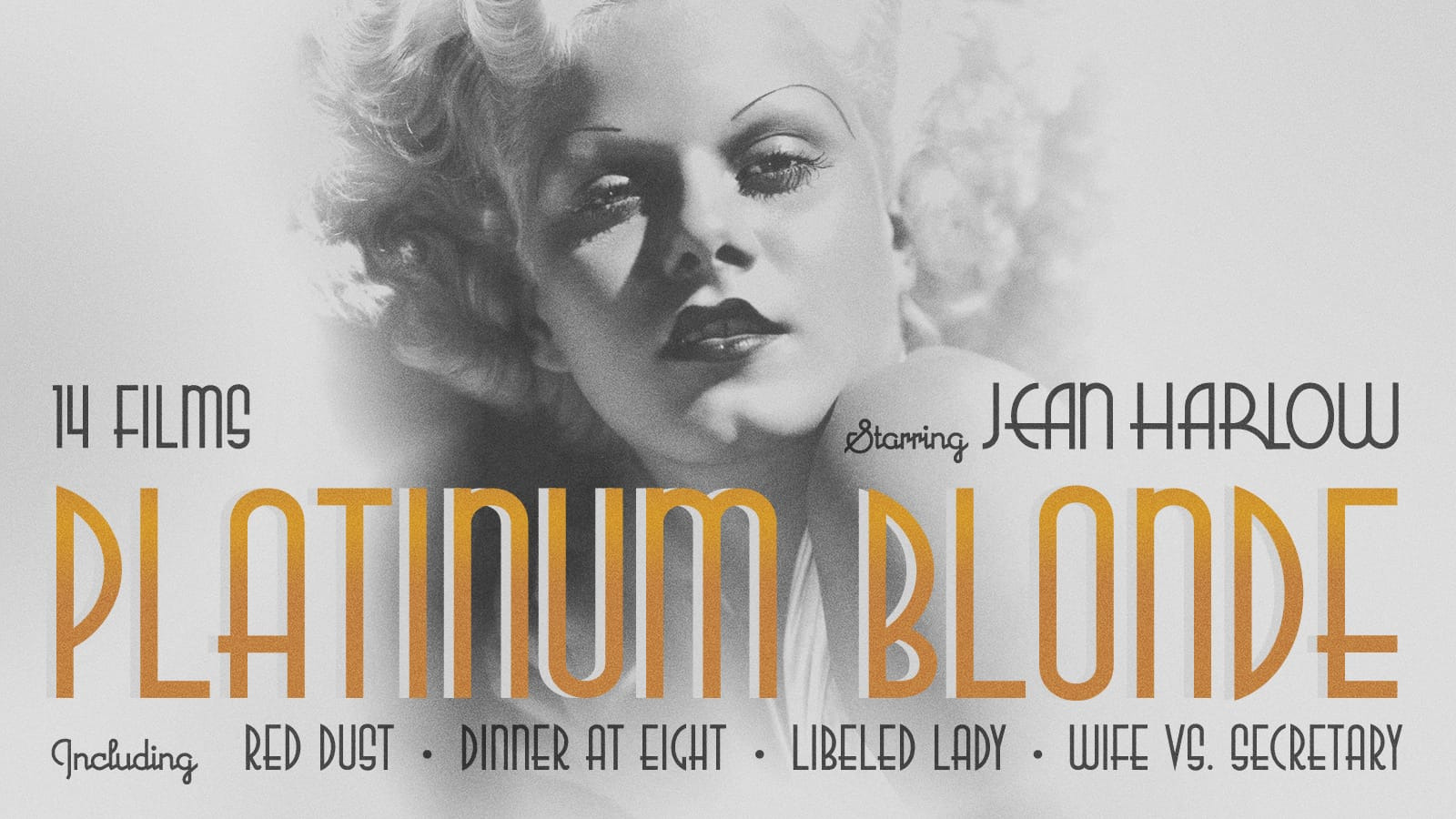
Platinum Blonde: Starring Jean Harlow
Hollywood’s original blonde bombshell, Jean Harlow rose to become one of the most popular stars of the thirties thanks to her irresistible combination of smoldering sensuality and tart, wisecracking brassiness. Embodying both the escapist glamor and streetwise grit of Depression-era American cinema, Harlow had a particularly potent chemistry with MGM’s top leading man, Clark Gable, with whom she was paired in smash hits like Red Dust, Hold Your Man, and Wife vs. Secretary. Also featuring George Cukor’s star-studded drawing-room tragicomedy Dinner at Eight and the delightful newsroom screwball Libeled Lady (costarring Harlow’s real-life flame William Powell), this tribute to one of the screen’s first truly modern movie stars showcases the marvelous comic timing and saucy allure that have made her—more than eighty years after her tragic death at age twenty six—an enduring legend.
FEATURING: Red Dust (1932), Red-Headed Woman (1932), Bombshell (1933), Dinner at Eight (1933)**, Hold Your Man (1933), The Girl from Missouri (1934), China Seas (1935), Reckless (1935), Riffraff (1935), Libeled Lady (1936), Suzy (1936), Wife vs. Secretary (1936), Personal Property (1937), Saratoga (1937)

The Ranown Westerns
Featuring Taylor Hackford’s documentary Budd Boetticher: A Study in Determination
A crucial link between the classicism of John Ford and the postmodern revisionism of Sam Peckinpah, the string of westerns made by Budd Boetticher and actor Randolph Scott in the late 1950s—known as the Ranown cycle after Scott’s production company—represent one of the great director-star collaborations in Hollywood history. All written, with the exception of Decision at Sundown and Buchanan Rides Alone, by expert screenwriter Burt Kennedy, the films made the most of their lean production values, achieving an expressively stripped-down stylistic purity that served to heighten their psychological tension. With Scott cast in each film as a taciturn loner pitted against a memorably complex adversary, the Ranown westerns display an extraordinary thematic and stylistic coherence that mark them as the work of a true, underappreciated auteur.
FEATURING: Seven Men from Now (1956), The Tall T (1957), Decision at Sundown (1957), Buchanan Rides Alone (1958), Ride Lonesome (1959), Comanche Station (1960)

Black Women’s Anthems: Four Films by Michelle Parkerson
For Michelle Parkerson, filmmaking and activism are inextricably entwined. Using her camera to bring untold stories of Black and queer female identity to the screen as a producer and director, Parkerson has profiled trailblazing performers and activists such as influential jazz singer Betty Carter, social-justice-oriented a cappella ensemble Sweet Honey in the Rock, and legendary drag performer Stormé DeLarverie, who played a key role in the Stonewall uprising. Her essential documentary works are presented alongside the Afrofuturist love story Odds and Ends, in which Parkerson brings her concern for feminist and LGBTQ issues into the realm of science fiction.
FEATURING: . . . But Then, She’s Betty Carter (1980), Gotta Make This Journey: Sweet Honey In The Rock (1983), Storme: The Lady of the Jewel Box (1987), Odds and Ends (1993)
CRITERION COLLECTION EDITIONS
PREMIERING AUGUST 1

The Big Chill (Lawrence Kasdan, 1983)
Criterion Collection Edition #720
Children of the sixties confront the uncertainty of their lives as adults of the eighties in this poignant and warmly humorous baby-boomer milestone, which may be the decade’s defining ensemble film.
SUPPLEMENTAL FEATURES: An interview with director Lawrence Kasdan, a cast-and-crew reunion from 2013, a documentary on the making of the film, and more.

La piscine (Jacques Deray, 1969)
Criterion Collection Edition #1088
Something sinister simmers beneath the summer sun of the French Riviera in this languorously alluring exercise in slow-burn suspense starring Alain Delon and Romy Schneider.
SUPPLEMENTAL FEATURES: The English-language version of the film; a documentary featuring cast and crew members; archival footage featuring Delon, Schneider, director Jacques Deray, and others; and more.

Amores perros (Alejandro G. Iñárritu, 2000)
Criterion Collection Edition #1060
The blistering debut from Alejandro G. Iñárritu is a harrowing and unforgettable plunge into a world of dog-eat-dog brutality and aching, interconnected humanity.
SUPPLEMENTAL FEATURES: A conversation between Iñárritu and filmmaker Paweł Pawlikowski, a conversation featuring Iñárritu and several cast members, rehearsal footage, deleted scenes, and more.

The Spy Who Came in from the Cold (Martin Ritt, 1965)
Criterion Collection Edition #452
John le Carré’s best seller about a Cold War spy on one final dangerous mission is transmuted into a hard-edged screen thriller every bit as precise and ruthless as the book.
SUPPLEMENTAL FEATURES: Interviews with le Carré and Richard Burton, selected-scene commentary featuring director of photography Oswald Morris, a documentary on le Carré, and more.
EXCLUSIVE STREAMING PREMIERES
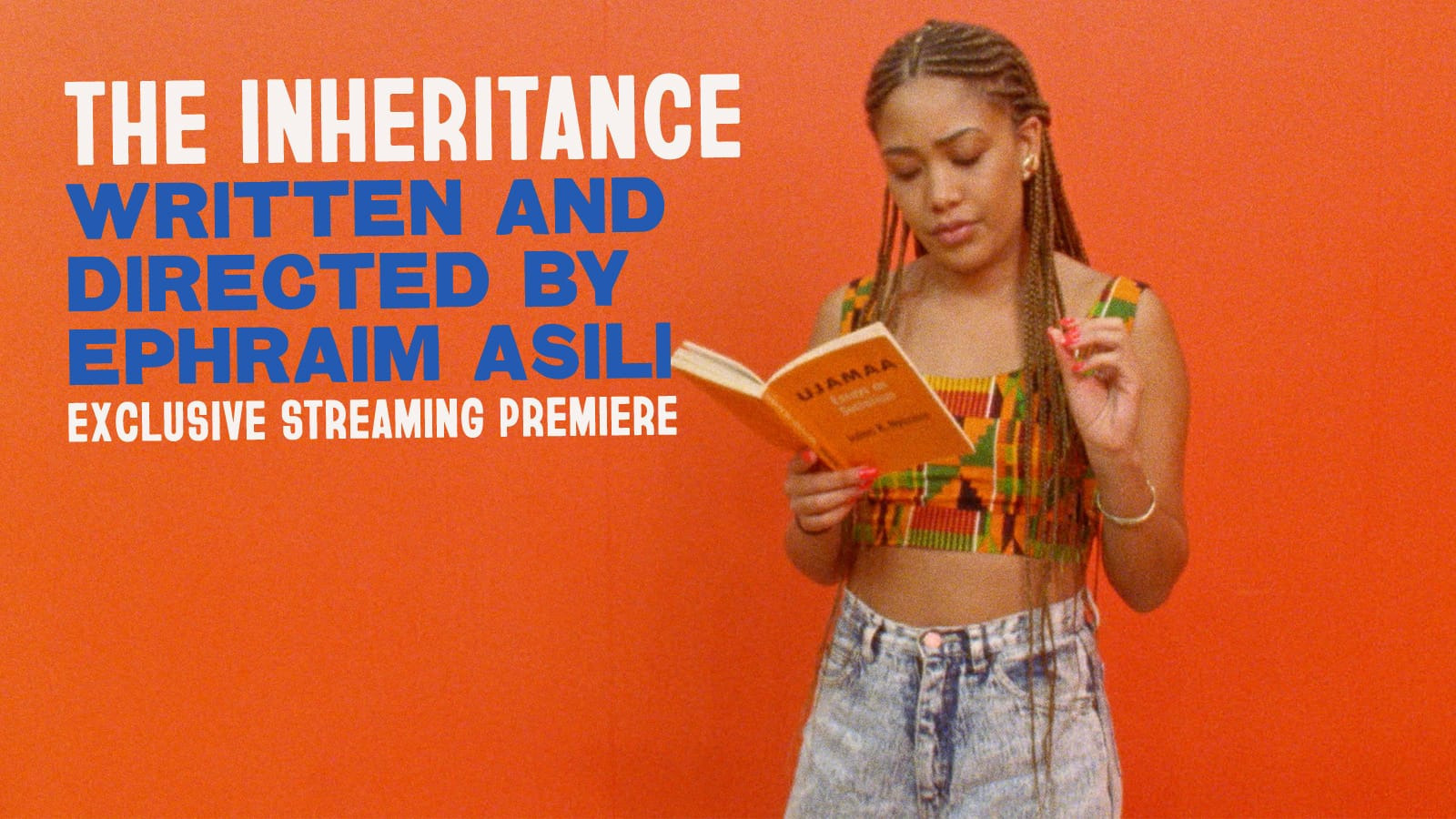
The Inheritance
SUNDAY, AUGUST 1
Presented with The Diaspora Suite and Notes on The Inheritance

The Diaspora Suite
Made over the course of seven years and shot on 16 mm in Brazil, Canada, Ethiopia, Ghana, Jamaica, and the United States, this revelatory cycle of five short films by Ephraim Asili collapses time and space to reveal the hidden resonances that connect the Black American experience to the greater African diaspora. Encompassing history, politics, music, dance, poetry, and ritual, The Diaspora Suite is a by turns playful, surprising, moving, and radical interrogation of colonialism’s legacy that puts forth a global vision of pan-African identity.
FEATURING: Forged Ways (2010), American Hunger (2013), Many Thousands Gone (2014), Kindah (2016), Fluid Frontiers (2017)
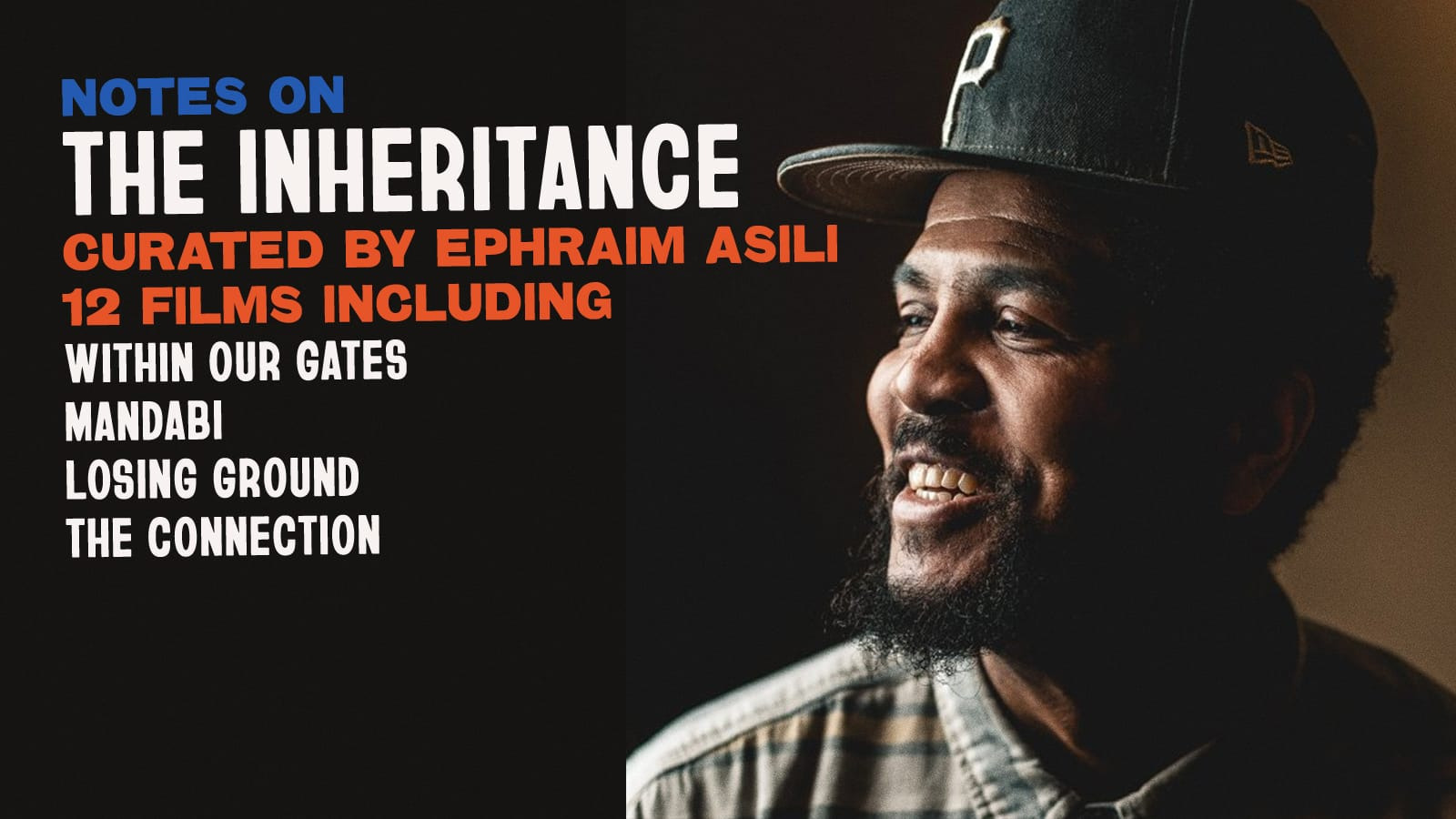
Notes on The Inheritance
To celebrate the streaming premiere of The Inheritance, director Ephraim Asili has curated a program of formally, intellectually, and politically radical films that inspired his brilliant debut feature. Encompassing landmarks of Black American cinema by Oscar Micheaux (Within Our Gates) and Kathleen Collins (Losing Ground), counterculture provocations by Shirley Clarke (The Connection) and Norman Mailer (Maidstone), and experimental documentaries by William Greaves (Symbiopsychotaxiplasm: Take One) and Chris Marker (Sans Soleil), the works he has selected reverberate with the same revolutionary spirit as the The Inheritance.
FEATURING: Within Our Gates (1920), The Connection (1961), 2 or 3 Things I Know About Her (1967), Mandabi (1968), Symbiopsychotaxiplasm: Take One (1968), Maidstone (1970), Tout va bien (1972), Amarcord (1973), Opening Night (1977), Losing Ground (1982), Sans Soleil (1983)

To the Ends of the Earth
MONDAY, AUGUST 16
Yoko (former J-pop idol Atsuko Maeda) travels with a small crew from Japan to Uzbekistan (breathtakingly captured by veteran DP Akiko Ashizawa) to shoot an episode of her reality-TV travel show. In front of the camera, her persona is carefree and happy-go-lucky, but behind the scenes she is cautious and introverted. Despite her best efforts, all the shoots end unsuccessfully. Frustrated, she takes to the streets of Tashkent on her own and finds herself adrift, confronting her deepest fears and hidden aspirations. Through a brilliant mix of black comedy, travelogue, drama, and showbiz satire, master director Kiyoshi Kurosawa (Cure, Tokyo Sonata) traces a young woman’s journey from displacement to self-discovery.
THREE DIMENSIONS

Three by Lee Isaac Chung
THURSDAY, AUGUST 5
Though he has only recently come to mainstream attention with his highly lauded, Oscar-nominated Minari, Lee Isaac Chung has been quietly crafting some of the most thoughtful and resonant works of contemporary American independent cinema for more than a decade. Interwoven with references to poetry and folklore, Chung’s films are fascinating, lyrical explorations of the landscapes, characters, and cultures that interest him—from Rwanda, where he shot his revelatory debut, to a fictionalized reimagining of New York City in the surreal fable Abigail Harm.
FEATURING: Munyurangabo (2007), Lucky Life (2010), Abigail Harm (2012)

Three by Mani Kaul: Poet of Parallel Cinema
THURSDAY, AUGUST 12
One of the major figures of India’s aesthetically and politically adventurous Parallel Cinema movement, Mani Kaul rejected traditional narrative structure in favor of mesmerizing formal experimentation. Deeply inspired by the gestural asceticism of Robert Bresson, Kaul’s films employ elliptical editing and an expressively spare visual style to achieve a purity that feels at once classical and bracingly original. Presented here are Kaul’s groundbreaking first three films: Our Daily Bread, which anticipates Chantal Akerman’s Jeanne Dielman in its absorbing meditation on housework and the burdens borne by women in a patriarchal society; the unconventional biopic One Day Before the Rainy Season; and Duvidha, an entrancing ghost story inspired by a Rajasthani folktale.
FEATURING: Our Daily Bread (1970), One Day Before the Rainy Season (1971), Duvidha (1973)

Animal Nature: Three by Denis Côté
THURSDAY, AUGUST 19
Fascinated by eccentric characters and unpredictable situations, prolific French Canadian filmmaker Denis Côté—who won the best director prize at this year’s Berlin Film Festival for his latest, Social Hygiene—has won a passionately devoted audience with his offbeat style and focus on those living outside the mainstream. This triptych brings together three of Côté’s typically unconventional best: Bestiaire, a tantalizing documentary musing on the human fascination with animals in captivity; the tragicomic lesbian romance Vic + Flo Saw a Bear; and Boris Without Beatrice, an arresting portrait of masculinity in deep crisis.
FEATURING: Bestiaire (2012), Vic + Flo Saw a Bear (2013), Boris Without Beatrice (2016)
WOMEN FILMMAKERS

Lore
WEDNESDAY, AUGUST 4
Lush cinematography and evocative landscapes lend a haunting fairy-tale quality to this powerful exploration of the Holocaust’s legacy seen through the eyes of a teenage girl.

Three by Lynn Hershman Leeson
WEDNESDAY, AUGUST 18
These strikingly prescient musings on technology, identity, and surveillance from innovative artist-filmmaker Lynn Hershman Leeson—whose work is also the subject of a major career survey this year at the New Museum in New York—toy cannily with the boundaries between the real and the virtual. All starring the inimitable Tilda Swinton—who plays, variously, nineteenth-century mathematics genius Ada Lovelace (Conceiving Ada), a scientist and her three identical “Self-Replicating Automatons” (Teknolust), and the wife of artist and wrongfully accused “bioterrorist” Steve Kurtz (Strange Culture)—these genre-defying works offer a boldly feminist, philosophically adventurous perspective on the brave new technological and political landscape that took shape at the turn of the twenty-first century.
FEATURING: Conceiving Ada (1997), Teknolust (2002), Strange Culture (2007)

Oxhide and Oxhide II
WEDNESDAY, AUGUST 25
Daily life in an impossibly cramped Beijing apartment takes on epic proportions in these mesmerizing, radically intimate portraits of working-class Chinese family life from director Liu Jiayin. Boldly transforming documentary into narrative, the filmmaker casts her parents and herself as fictionalized versions of themselves, capturing small moments that reveal deep insights into the mysteries of family relations and the art of everyday living. Made with virtually no budget and boundless ingenuity, Oxhide and its sequel take the microscopic physical and emotional details that make up a family and magnify them on a widescreen canvas.
More women filmmakers featured in this month’s programming: Black Women’s Anthems: Four Films by Michelle Parkerson, The Connection (1961), Ticket of No Return (1979), Losing Ground (1982), Paris Is Burning (1990), Youssou N’Dour: I Bring What I Love (2008), Kings of Pastry (2009), Top Spin (2014), Moving (2019), Dustin (2020), The End of Suffering (A Proposal) (2020), Hella Trees (2020)
TRUE STORIES

No Data Plan
MONDAY, AUGUST 2
Filipino American filmmaker Miko Revereza crosses the country by train in a profound meditation on the “modern fugitivism” of the undocumented experience, presented along with a pair of his shorts.
FEATURES: No Data Plan (2019)
SHORTS: Disintegration 93–96 (2017), Distancing (2019)

Youssou N’Dour: I Bring What I Love
MONDAY, AUGUST 9
The music of Senegalese pop sensation Youssou N’Dour propels this stirring story of faith, redemption, and the power of music to overcome intolerance.

Chronicle of a Summer (Jean Rouch and Edgar Morin, 1961)
Criterion Collection Edition #648
MONDAY, AUGUST 23
“Are you happy?” A seemingly simple question serves as the basis for this penetrating diagnosis of early-sixties French society from filmmaker-anthropologist Jean Rouch and sociologist Edgar Morin.
SUPPLEMENTAL FEATURES: Un été + 50, a documentary featuring outtakes from the film and interviews with some of its participants; interviews with codirector Jean Rouch and Marceline Loridan, one of the film’s participants; and more.

Kings of Pastry
MONDAY, AUGUST 30
Documentary legends D. A. Pennebaker and Chris Hegedus capture the high drama and sugar-spun delights of France’s most prestigious pastry competition.
More documentaries featured in this month’s programming: Black Women’s Anthems: Four Films by Michelle Parkerson, Oxhide and Oxhide II, Life’s a Drag, Let There Be Light (1946), Islands of Fire (1954), Symbiopsychotaxiplasm: Take One (1968), Strange Culture (2007), Bestiaire (2012), Top Spin (2014)
SATURDAY MATINEES

Annie
SATURDAY, AUGUST 7
It’s a hard knock life! The irrepressible orphan wins the day in this much-beloved ray of cinematic sunshine bursting with boisterous songs and irresistible performances.

The Secret of NIMH
SATURDAY, AUGUST 14
Richly realized characters and beautifully detailed animation shine in this dark-tinged fable, one of the most unique and imaginative children’s movies of the 1980s.

Sons of the Desert
SATURDAY, AUGUST 21
Legendary comedy team Laurel and Hardy’s celebrated rapport is on virtuosic display in their finest feature.

Top Spin
SATURDAY, AUGUST 28
Three fiercely committed teenagers battle their way through the world of competitive table tennis in this offbeat coming-of-age sports documentary.
SHORT-FILM PROGRAMS
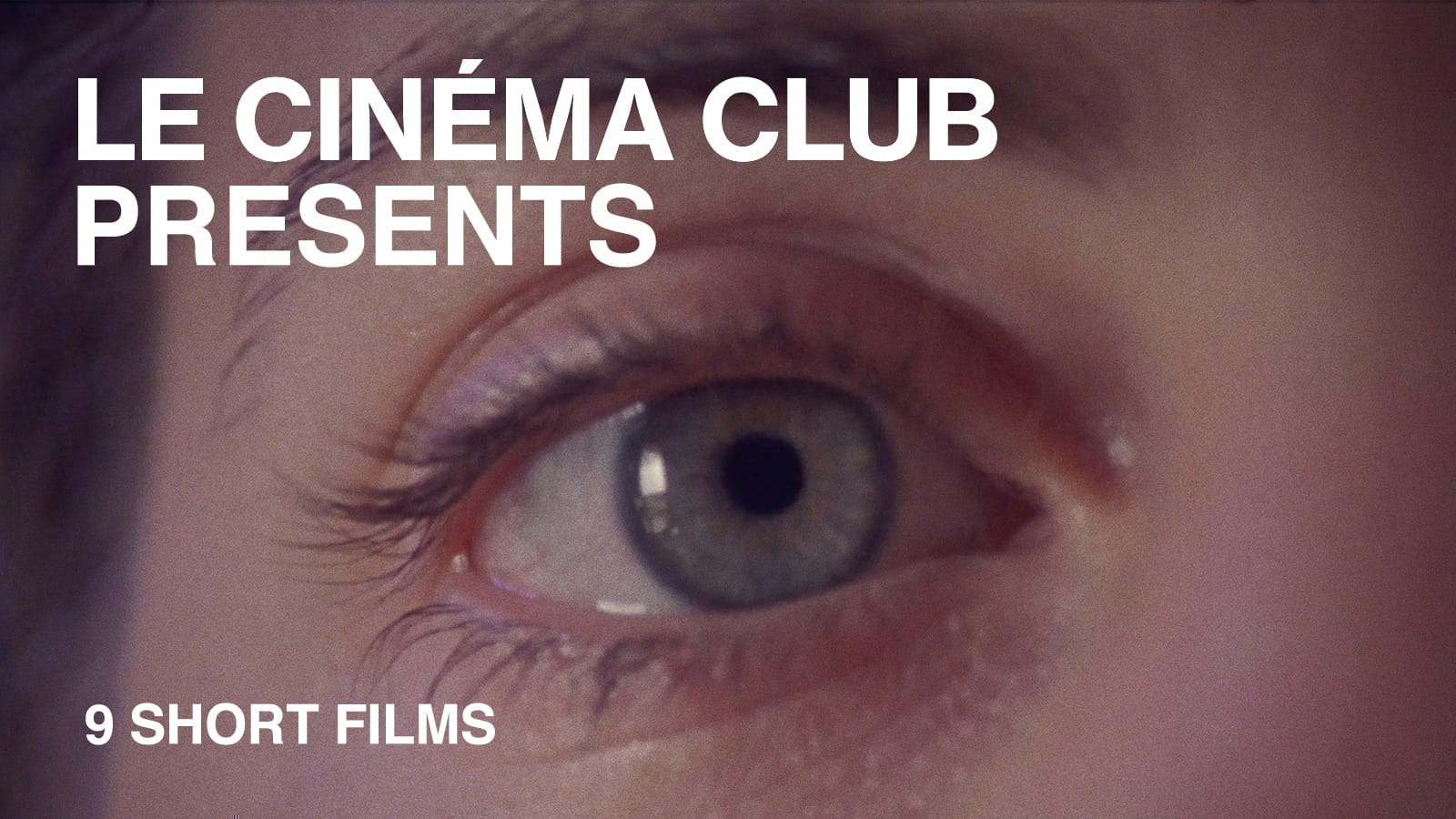
Le Cinéma Club Presents
TUESDAY, AUGUST 3
Criterion is thrilled to partner with Le Cinéma Club for this selection of cutting-edge contemporary short films. A free and curated online cinema, Le Cinéma Club streams one film a week, celebrating a new generation of filmmakers and uncovering inspiring discoveries from the past. This program gathers some of their recent favorite films, spotlighting emerging directors and newly acclaimed voices. These award-winning films were shot all over the world, with themes that are both timely and timeless, but were selected for their distinctive storytelling. Extending across genre and form, these films are inventive, hybrid, playful, cosmic, and personal, blazing adventurous paths for the future of cinema.
FEATURING: Braguino (2017), I Signed the Petition (2018), Blessed Land (2019), The Marvelous Misadventures of the Stone Lady (2019), Moving (2019), Dustin (2020), The End of Suffering (A Proposal) (2020), Hella Trees (2020), Lizard (2020)

Short + Feature: Student Bodies
The Devil’s Harmony and Brick
TUESDAY, AUGUST 10
Murder and mystery shake the halls of two high schools in a black-comic short and Rian Johnson’s ingenious teenage noir.

Short + Feature: Bureaucratic for the People
Sticker and Sorry We Missed You
TUESDAY, AUGUST 17
The System got you down? Commiserate with two hard-hitting looks at the soul-crushing frustrations of trying to succeed in the face of unfeeling bureaucracy and endless red tape.

Short + Feature: Mob Injustice
Mizaru and Canoa: A Shameful Memory
TUESDAY, AUGUST 24
Vigilantes take it upon themselves to uphold public morality with devastating consequences in an unsettling one-take short and a daring work of Mexican political cinema.

Short + Feature: Under the Volcanoes
Islands of Fire and Stromboli
TUESDAY, AUGUST 31
The elemental power of nature is on dramatic display in a breathtaking documentary and a neorealist landmark, both set against the backdrop of the volcanic islands off the coast of Sicily.
DOUBLE FEATURES

Double Feature: Life’s a Drag
The Queen and Paris Is Burning
FRIDAY, AUGUST 6
Two exhilarating documentaries capture the vibrant world of drag shows and ball culture where New York City’s queer communities gathered in the 1960s and ’80s.

Double Feature: Through the Looking Glass
Alice and Black Moon
FRIDAY, AUGUST 13
Tumble down the rabbit hole with two dark, surrealist takes on Lewis Carroll’s Alice’s Adventures in Wonderland.

Double Feature: Trier on Tap
Louder Than Bombs and Thelma
FRIDAY, AUGUST 20
Joachim Trier, one of the most virtuosic and versatile directors working today, displays his remarkable range and richly novelistic style in a quietly powerful family drama and a spellbinding supernatural thriller.

Double Feature: Wet Hot Delon Summer
Purple Noon and La piscine
FRIDAY, AUGUST 27
Something sinister simmers beneath the summer sun when Alain Delon gets mixed up in murder in a pair of sultry, Mediterranean-set thrillers.
PLUS: NEW ADDITIONS TO PREVIOUS PROGRAMS
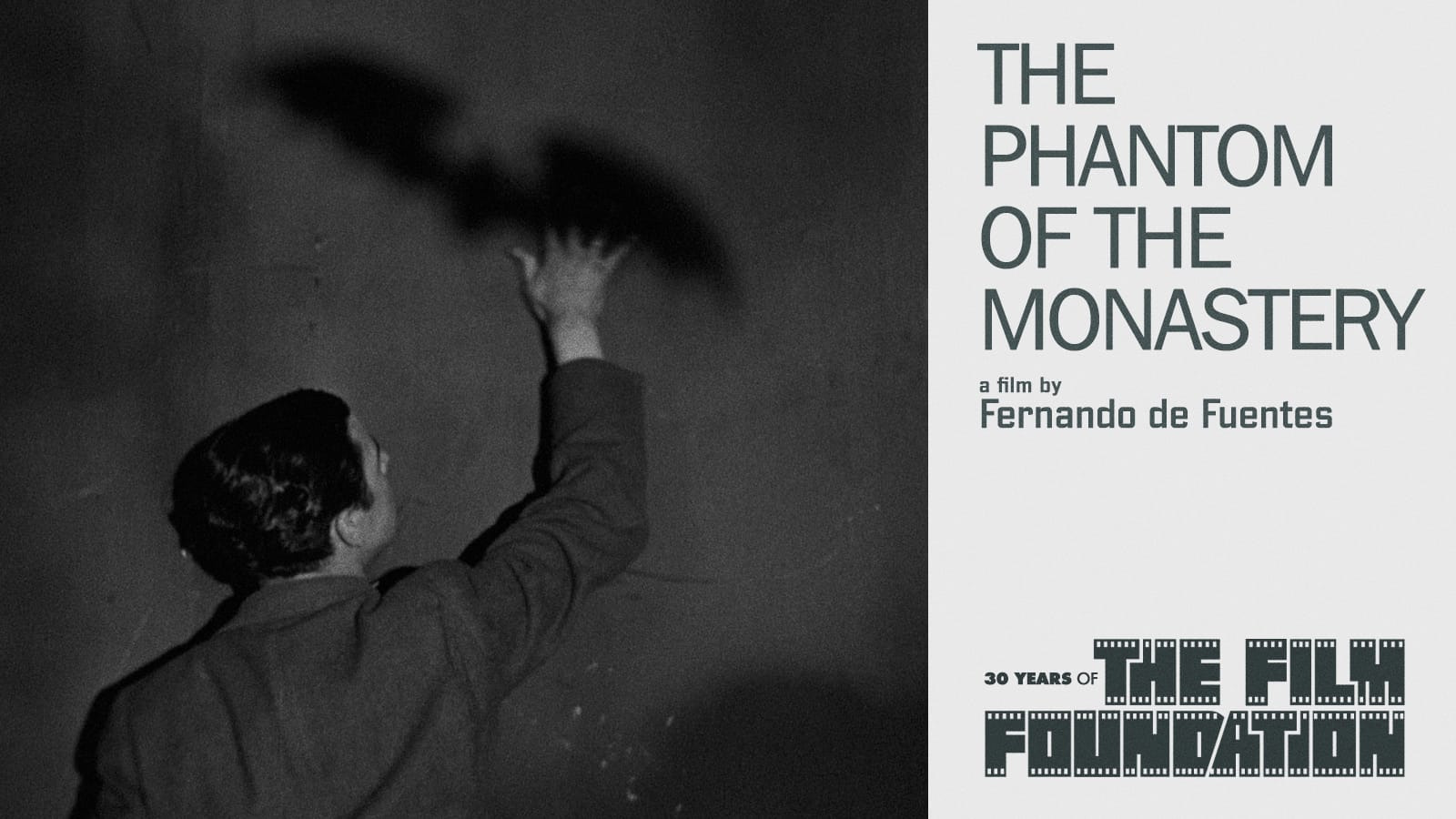
Now Playing in 30 Years of The Film Foundation: The Phantom of the Monastery
In November, we kicked off our thirtieth-anniversary celebration for film-preservation powerhouse The Film Foundation, founded by Martin Scorsese in 1990. This month’s spotlighted restoration, brought to you by the World Cinema Project, is one of the most influential horror films in the history of Mexican cinema.



